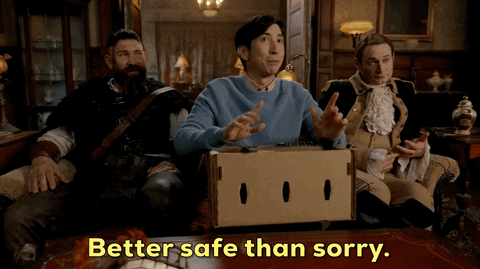Disclaimer: My content is NOT a substitute for professional advice, diagnosis, or treatment. When in doubt, ask a therapist!
Have you been in a “conversation simulation”?
Well, have you ever imagined how a conversation will play out in real life… so that you can feel more prepared?
This is especially the case for me when I have difficult conversations, say a client negotiation.

But just how helpful is mental rehearsal in communication or social situations?
Research: Why you mentally rehearse conversations
After reviewing 10+ years of research, researchers found that imagined interactions — the mental rehearsal of conversations — have several benefits:
- Preparing for a future conversation
- Processing a past conversation and even link it to a present/future conversation, which helps contextualize their response
- Expressing things they wouldn’t say to the other person, leading to emotional relief
In a study, participants who mentally rehearsed their speech had fewer silent pauses and more fluency in their actual delivery. They also felt less nervous.
But here’s when mental rehearsal becomes problematic:
Mental rehearsal can be a safety behavior
Social anxiety researchers identified mental rehearsal as a safety behavior.
(Safety behaviors are things you do/don’t do to avoid anxiety — learn more about them here.)
Specifically, they note that “mentally rehearsing sentences [to reduce the chance of stumbling over your words] may make it more likely that you will stumble over your words.”
In other words, if there’s an avoidance component in your mental rehearsal, and if it’s excessive, the rehearsal isn’t a helpful behavior. Let me give you an example:
You spent the last two hours rehearsing a one-minute speech at a good friend’s birthday party. That should be way more than enough right?
But because you felt really anxious, you convinced yourself that you needed to rehearse even more…

Now, avoidance can be hard to pinpoint, since it’s often subtle. Here are a few signs of unhelpful mental rehearsal that you should be mindful of:
Signs of unhelpful mental rehearsal
1. Do you find yourself repeatedly rehearsing to the point that the time you spent on rehearsal just doesn’t make sense?
For example, if you want to say hi to a fellow gym-goer, do you use up your entire workout session just to brainstorm the absolute best way to approach her/him? Or do you just walk over and say “hello”?
2. Do you notice that your anxiety is increasing as you rehearse?
Safety behaviors like excessive mental rehearsal — especially when they loop again and again — can lead to an increase in social anxiety, as they get you locked into the Social Anxiety Spiral.
Make mental rehearsal helpful again – here’s how
Be compassionate towards yourself
Excessive mental rehearsal doesn’t mean that there’s anything wrong with you!
It’s just a tactic employed by your logical brain, i.e. the prefrontal cortex, to help cope with your anxiety.
Be realistic
It’s very hard to not mentally rehearse at all (read what I just wrote about the brain!)
Just gently remind yourself that some mental rehearsal is helpful, too much is not. You can also try the following tip:
Zoom out of your mind
If you find yourself getting stuck in rehearsal mode, here’s how to get unstuck — broaden your attention by being mindful! Check out the following resources I created for ya 😎
- Drop an anchor (an Acceptance and Commitment Therapy technique)
- A list of my favorite mindfulness techniques
Mental rehearsal + therapy
In the context of therapy, mental rehearsal can be a powerful tool to help you manage your social anxiety.
A study shows that mental rehearsal — as an extension of exposure therapy — is a promising treatment.
Just blurt it out
A common fear of excessive mental rehearsal is, “If I don’t say exactly the right thing, they won’t like me“
To challenge that assumption, you can try just saying things without filtering yourself. This might sound scary, but it’s actually liberating, based on my experience. (Learn more about the power of blurting it out here.)
“Honestly, that is the best advice for life: no note cards”
– Pema Chodron
Related articles

